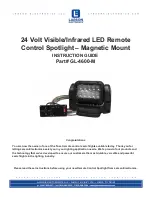
PAGE 3 OF 9
0621 IH-7272
INSTALLATION CONTINUED
7. Place screws (provided) in holes on the canopy.
8. Route exit input wires through knockout in exit frame,
pipe nut and metal mounting plate.
9. Make wiring connection. For 120V, use black and
white wires; for 277V, use red and white wires.
WARNING! Properly insulate the unused lead
with a wire nut (provided) or other approved means.
10. Push wire connections into junction box. Secure
mounting plate to junction box (hardware not included).
11. Secure canopy to steel mounting plate with screws
installed in step seven.
12. Place pipe nipple through mounting
hole of frame until gasket touches
frame. Thread a second nut onto
pipe nipple on the inside of frame to
lock canopy into place. (See Figure 9)
Once canopy is locked, there will
not be any side-to-side movement.
13. Remove proper chevron(s) as required. When
removing chevrons, it may be helpful to remove
diffuser to allow easier access to chevrons.
NOTE: Remember to reinstall the diffuser once
chevron(s) have been removed.
14. Connect battery to lamp board.
15. Secure faceplate(s) to frame
with screws. (See Figure 10)
NOTE: Push center of
lens to balance when
tightening screws.
16. Press to make sure unit is
locked onto the wall tightly.
Distance between bracket
and wall should be less than
2 mm. (See Figures 11-12)
17. Apply continuous AC
power and press test
button to check operation.
Figure 12
Push
MAINTENANCE
OPERATION
BATTERY BACKUP
1. Apply AC power to the unit. The LED indicator will be red.
2. After the battery has been left to charge for two
hours, test the unit by pushing the switch. The LED
indicator turns off and the LED board stays on.
3. When the switch is released, the LED indicator turns
back to red and the LED board stays on.
CAUTION! Always turn off AC power to the equipment before servicing. Servicing should be performed
only by a qualified service technician. Only use manufacturer supplied replacement parts.
BATTERY
Figure 9
Figure 10
Figure 11
The battery supplied with this model requires no
maintenance. However, it should be tested periodically
and replaced when it no longer operates the connected
sign for the duration of a 30-second or 90-minute test.
The supplied battery has a life expectancy of five years
when used in a normal ambient temperature of 72ºF.
NPFA 101 (Life Safety Code) requires that all emergency
lighting equipment be functionally tested every 30 days
for a minimum of 30 seconds, and tested annually for
a full 90-minute duration. Written records of the testing
are to be kept for examination by the authority having
jurisdiction.
1-800-295-5510
uline.com



























